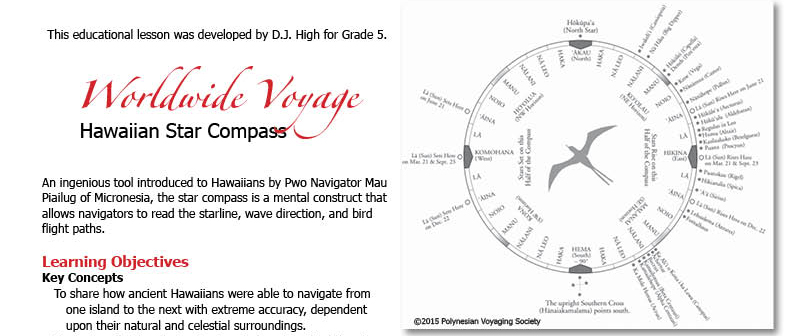
Worldwide Voyage: Hawaiian Star Compass
 An ingenious tool introduced to Hawaiians by Pwo Navigator Mau Piailug of Micronesia, the star compass is a mental construct that allows navigators to read the starline, wave direction, and bird flight paths.
An ingenious tool introduced to Hawaiians by Pwo Navigator Mau Piailug of Micronesia, the star compass is a mental construct that allows navigators to read the starline, wave direction, and bird flight paths.
Learning Objectives
Key Concepts
To share how ancient Hawaiians were able to navigate from one island to the next with extreme accuracy, dependent upon their natural and celestial surroundings.
Students will utilize their prior knowledge of cardinal directions (N, S, E, and W) and angles to build a full size Hawaiian Star Compass.
Standard Benchmarks
Solve real world problems involving multiplication of fractions and mixed numbers.
Use models and/or simulations to represent and investigate features of objects, events, and processes in the real world.
Describe the relationship of Earth (size and distance) to other components in the solar system
Assessment
Students will be assessed on their ability to correctly build a Hawaiian Star Compass based off of its alignment through natural forces.
Students will also need to correctly label cardinal directions on their compass and use a protractor to mark out 90º angles between each direction.
The students’ ability to work cohesively will come into play as their General Learner Outcomes of community contributor.
Materials
SMARTboard/Whiteboard
Protractor
String
Natural materials to use as markers (rocks, sticks, etc.)
Compass
Compass app for smart phone
Individual whiteboards (4 or 8)
Whiteboard markers (4 or 8)
Oli/Kahea
Lesson
Lesson specifics are available online.
The foundational framework for the Art of Wayfinding is the sidereal Star Compass. The star compass is a mental construct and not physical like a western compass. The visual horizon is divided into 32 houses, a house being a bearing on the horizon where a celestial body resides. Each of the 32 houses is separated by 11.25˚ of arc for a complete circle of 360˚.
Resources
Oli/Kahea
Star Compass Lesson
More about the Star Compass
Track the Worldwide Voyage
This educational lesson was developed by D.J. High for Grade 5.


